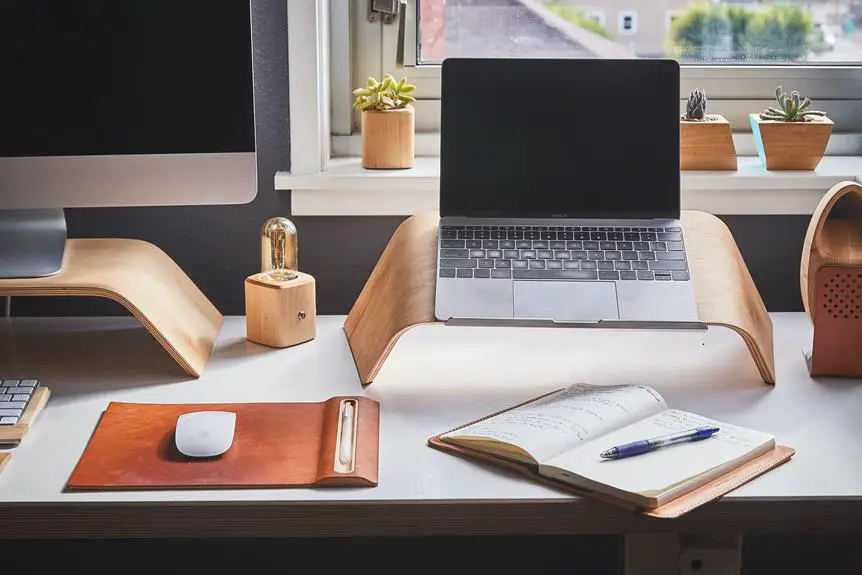You might think that having a tower for your home office computer is absolutely essential for top-notch performance, but is it really?
Let's dive into the world of home office computing and explore the necessity of a traditional tower.
Whether you're a tech-savvy professional or an aspiring home office guru, understanding the role of a tower in your setup is crucial for optimizing your work environment.
Let's break down the benefits, drawbacks, and alternatives to using a tower, so you can make an informed decision that suits your mastery-level needs.
Key Takeaways
- Towers offer better performance and flexibility for home office computers.
- Compact desktop options are ideal for smaller workspaces and require minimal maintenance.
- All-in-one solutions provide functionality in a space-saving package and have integrated peripherals.
- Mini PC alternatives are powerful and lightweight, making them ideal for space efficiency and versatility.
Benefits of Using a Tower
You'll experience better performance and more flexibility with a tower for your home office computer. When it comes to upgrade options, a tower provides ample space for additional hardware such as extra storage, graphics cards, and more. This means you can easily customize and expand your system as technology advances, ensuring that your computer stays up to date with the latest advancements.
Additionally, towers generally have better cooling efficiency compared to smaller form factors like mini PCs or all-in-one systems. The larger size allows for improved airflow and the installation of larger, more effective cooling systems, which is crucial for maintaining optimal performance, especially during heavy workloads or gaming sessions.
This enhanced cooling capability not only helps to prolong the lifespan of your components but also reduces the risk of overheating and performance throttling. With a tower, you have the freedom to choose from a wide range of upgrade options and can rest assured knowing that your system will remain cool and responsive, even as you push its limits.
Drawbacks of Using a Tower
If you have limited space in your home office, a tower may take up more room than alternative form factors. Drawbacks of using a tower include its space constraints, as it requires a dedicated area on or under your desk. This can be particularly challenging if your workspace is small and you need to optimize every inch of it.
Another drawback is the cost efficiency of a tower. In some cases, towers can be more expensive than other form factors with similar or superior performance. Additionally, due to their larger size, they may consume more power, resulting in higher electricity bills over time.
Furthermore, upgrade limitations are a concern when using a tower. While towers typically offer ample space for additional components, such as hard drives and graphics cards, their size can also limit your ability to easily transport or reconfigure your setup. This can make it less convenient to upgrade or modify your system as your needs evolve.
Considering these drawbacks, it's important to weigh the pros and cons before deciding on a tower for your home office computer.
Alternatives to a Traditional Tower
Looking for alternatives to a traditional tower for your home office computer?
Consider compact desktop options, which offer space-saving designs without sacrificing performance.
All-in-one solutions provide a streamlined setup with integrated displays, while mini PC alternatives offer portability and versatility in a small form factor.
Compact Desktop Options
When considering a home office computer, it's important to explore compact desktop options as alternatives to a traditional tower. These compact desktops are designed with a small footprint, making them ideal for smaller workspaces.
Despite their size, they offer powerful performance, suitable for demanding tasks such as graphic design or video editing. Additionally, compact desktops are known for their energy efficiency, consuming less power compared to traditional towers, which can lead to cost savings in the long run.
Moreover, these alternatives require minimal maintenance, providing a hassle-free computing experience.
With their space-saving design, impressive performance, and low maintenance requirements, compact desktop options are worth considering for your home office setup.
All-In-One Solutions
Consider an all-in-one solution instead of a traditional tower for your home office computer. All-in-one solutions integrate the computer's components into the monitor, providing a sleek and space-saving option for your workstation.
Here are a few reasons why an all-in-one solution might be the right choice for your home office:
- Space Efficiency: All-in-one computers are compact and require minimal space, making them ideal for smaller home office setups.
- Integrated Peripherals: These systems often come with built-in webcams, speakers, and microphones, reducing the need for additional external peripherals.
- Aesthetics: All-in-one solutions offer a clean and minimalist look, decluttering your workspace and enhancing the overall visual appeal of your home office.
When considering your home office computer setup, an all-in-one solution can provide the functionality you need in a space-saving and stylish package.
Mini PC Alternatives
Considering space efficiency and versatility, Mini PCs offer a compelling alternative to traditional towers for your home office computer. These compact devices pack impressive performance and portability, making them an attractive option for those seeking a streamlined setup without sacrificing power. Take a look at the comparison below to see how Mini PCs stack up against traditional towers in terms of performance and portability.
| Criteria | Mini PC | Traditional Tower |
|---|---|---|
| Performance | Powerful processors and | High-end CPUs and GPUs |
| integrated graphics cards | for demanding tasks | |
| Portability | Small and lightweight, | Bulky and less portable |
| easy to move or relocate | due to size and weight |
Mini PCs excel in performance and portability, making them an excellent choice for a home office computer that prioritizes space efficiency and versatility.
Considerations for Home Office Setup
When setting up your home office computer, there are several factors to consider.
Firstly, you'll want to think about the pros and cons of a traditional tower versus more compact options.
Secondly, it's important to consider how the computer will fit into your workspace in terms of both space and aesthetics.
Lastly, don't forget to take into account the performance and upgrade capabilities of different computer setups to ensure it meets your long-term needs.
Tower Vs. Compact Options
You might wonder whether a tower or compact computer is the best fit for your home office setup. When considering the Tower Vs. Compact Options, it's essential to weigh the following:
- Space Saving Solutions: Compact computers are designed to save space and reduce clutter, making them ideal for small home office setups.
- Aesthetics and Functionality: Compact options often come in sleek designs, blending well with modern home office decor, while also offering the same level of functionality as traditional towers.
- Portability: If you need the flexibility to move your computer around, compact options are generally lighter and more portable than traditional towers.
Considering these factors will help you determine whether a compact or traditional tower is the best choice for your home office setup.
Space and Aesthetics
For your home office setup, a compact computer offers space-saving and aesthetically pleasing solutions. With its minimalist design, a compact computer takes up less space, providing you with more room to work and move around in your home office. This is especially beneficial if you have limited space or prefer a clean, uncluttered workspace.
The sleek and modern look of a compact computer can also enhance the overall aesthetic of your home office, creating a professional and organized environment. Additionally, the compact size allows for easier integration into your existing office furniture, making it a seamless addition to your setup.
Performance and Upgrades
Consider upgrading to a more powerful and versatile computer to enhance your home office setup. Upgrading your computer will provide performance improvements and upgradability, ensuring that your system can handle the demands of your work.
Here are three key considerations for maximizing your home office computer's potential:
- Processor: Opt for a multi-core processor to handle multitasking and resource-intensive applications efficiently.
- Memory: Increase your RAM for smoother multitasking and improved overall system responsiveness.
- Storage: Consider upgrading to a solid-state drive (SSD) for faster boot times and application loading.
Future-Proofing Your Home Office
When future-proofing your home office, prioritize investing in components that can be easily upgraded. This approach ensures that your home office setup remains efficient and powerful as technology advances. One crucial aspect of future-proofing is creating an ergonomic workspace that promotes comfort and productivity. Investing in adjustable desks, ergonomic chairs, and monitor arms can significantly improve your work environment and prevent potential health issues.
| Upgradeable Components | Potential Benefits | Emotional Impact |
|---|---|---|
| Modular Desk Setup | Adaptable to changing needs | Feel empowered and in control |
| High-Performance CPU | Improved multitasking and processing power | Feel confident and ahead of the curve |
| Expandable RAM | Seamless handling of demanding tasks | Feel assured and capable |
Making the Right Choice
If you want a home office computer setup that fits your needs and maximizes productivity, making the right choice when it comes to hardware is essential.
To ensure you make an informed decision, consider the following:
- Research: Take the time to research different hardware options. Look for reviews, benchmarks, and comparisons to understand what'll work best for your specific needs.
- Consider Budget-Friendly Options: While it's tempting to go for the latest and greatest, consider more budget-friendly options that still meet your requirements. Sometimes, older models or slightly lower specs can be a great compromise without breaking the bank.
- Future-Proofing: Think about your long-term needs. Investing in hardware that can be easily upgraded or expanded in the future can save you money in the long run.
Frequently Asked Questions
Can I Use a Tower for Gaming as Well as for My Home Office Work?
You can definitely use a tower for gaming as well as for your home office work. A powerful tower is essential for smooth gaming and handling multimedia tasks. It provides the necessary performance and versatility.
How Much Power Does a Tower Consume Compared to Other Alternatives?
Compared to other alternatives, towers generally consume more power due to their high-performance components. This can have a greater environmental impact. Consider energy-efficient options like all-in-one PCs or mini PCs for your home office.
Will a Tower Take up a Lot of Space in My Home Office?
A tower can take up a significant amount of space in your home office, but it offers great space efficiency for its components. Its sleek design can also add to the aesthetic appeal of your workspace.
Are There Any Specific Security Concerns With Using a Tower for My Home Office Computer?
Security concerns with using a tower for your home office computer include potential risks of physical tampering and unauthorized access. Additionally, compatibility issues and performance impact should be considered when deciding whether to use a tower.
Can I Easily Upgrade and Customize a Tower for Future Needs?
You can easily upgrade and customize a tower for future needs. Towers offer a wide range of customization options, allowing you to adapt and enhance your home office computer as your requirements evolve.




